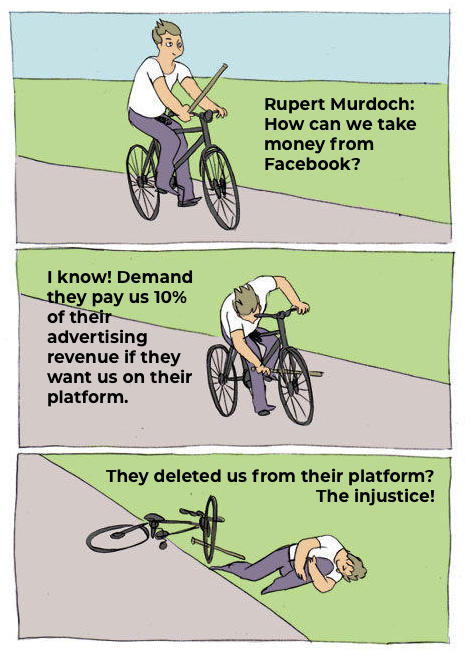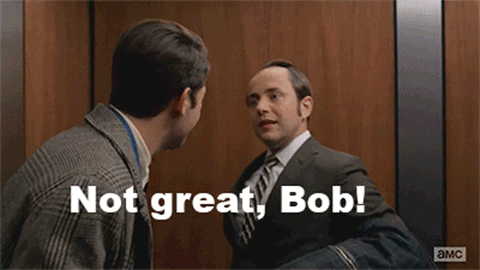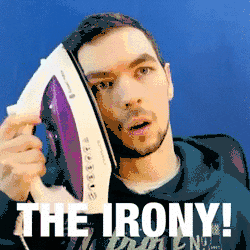Last week, Australians woke up to find that Facebook pages of news outlets, as well as some of NGOs, charities, small businesses, and even Government departments, had been wiped clean. This triggered a firestorm of fury - some voices raging against their own Government, with others vocally (and at times, graphically) denouncing Facebook as the devil.
What’s interesting is that for all the bluster out there, very few people seem to know why we even got to this point in the first place. As my partner puts it, “people like to just read the headline and be angry.”
Well, that’s not me. (And frankly, I hope it’s not you either.)
This week’s newsletter is a deep dive into how the Australian Government decided to essentially tax Facebook and Google to help its dinosaur buddies in the media industry.
It’s a long one, so strap in…
Don’t care about Australia or Facebook? Fair dinkum. Skip on ahead to my Recommended Resources at the bottom of this newsletter - there are some gold nuggets this week! 👇
Let’s start with a story.
Imagine this scenario.
You are the owner of a large bookstore, one of a few in the community.
One day, a big cafe opens up next door. Everyone is super excited - it’s the only place to get decent coffee within a 100 km radius. And best of all, it’s free (you just need to sign in with your completed personal profile, yadda yadda)!
You head next door to meet Henry, the owner of the cafe. He’s a skinny kid with a beard and glasses.
“Hey Henry,” you say, “Would you mind if I leave a chapter of our latest book in your cafe for your customers to check out? It’s only going to be the first chapter though - if they want to read more of it, they’re going to have to go to my store to buy the book.”
“Sure, whatever,” Henry says, waving his hand. He scrawls a “To read more, go next door” post-it note on the back of the chapter you give him, and leaves it on one of the cafe tables.
For a while, things seem to be going well. You’re still getting your regular customers coming into your bookstore, but you notice that almost one in four are dropping by because they read the first chapter of one of your books at the cafe next door.
There is a problem though - you don’t really make money off of selling books in your store. Rather, you have an old, dilapidated corkboard where local businesses can come into your store to pay to pin up their black and white classified ads.
One day though, you notice that advertising revenue is down. Businesses don’t seem to want to post their classifieds up on your ugly, worn out corkboard anymore.

Glumly, you head next door to Henry’s cafe. He’s there, busy wiping down a table.
“Hey mate, what’s up?” He asks.
“I was wondering how my latest book chapter is going,” you say.
“Eh - it’s alright,” he replies with a shrug. “Sometimes a customer comes in asking for it, and we tell them to go to you if they want to find out more.”
You’re not really listening though. You’ve noticed that on the other side of the cafe wall, there’s now an enormous, floor-to-ceiling screen. It’s displaying high resolution, colourful ads from a number of local businesses. A bunch of customers are clustered around it, their eyes glued to the screen.
“What the hell is that?!” you ask, outraged.
“Ah that’s our new advertising screen. Because we don’t charge for our coffee, we charge advertisers to put up ads on it that our customers can see. It’s pretty neat actually - as an advertiser, you can create your ad and instantly see it up there, without even needing to be in the cafe!”
You’re furious. Of course no one wants your crappy corkboard ad space when there’s a shiny new advertising system right next door! Oh the unfairness of it all!
Later that night, you ask your brother-in-law, Bob, out for a whiskey and cigar. He works in the Government, and might be able to do something about this whole thing.
You explain to him how it’s so unfair: your book chapters are drawing people to the cafe next door, and they’re making advertising money because of it - at your expense! The outrage!
“So how many of the cafe customers are going in there just because of your book chapters?” Bob asks.
You have no idea, but you assure him it’s a lot.
“And how much of their advertising revenue do you think is made because of your book chapters?” Bob continues.
You have no idea, but you assure him it’s a lot.
“How many people is the cafe directing to your door?”
“About a quarter of my customers are coming in from the cafe.”
Bob pauses for a moment. “Right. So some people go to them because of you, and some people go to you because of them.”
Bob clearly doesn’t get it. You sit in stony silence, glaring at your whiskey, feeling sorry for yourself.
“You know, mate,” Bob continues gently, “if you don’t like it, you don’t need to leave a chapter of your books with them. If your chapters are really bringing in the big bucks for them, then show them who’s boss by taking them back - they’ll be begging you for the chapters back in no time!”
“What!” you shout. “Are you out of your mind?! If I pull the chapters from the cafe, then I’d lose a quarter of my customers! Ad revenue would go down even more!”
Silence.
“Rightio,” Bob says with a shrug. “So what do you want me to do about it?”
“Make them pay!” you roar. “I want 10% of every cent they earn! I want them to pay ME for having the privilege of my book chapters!”
“You want them to pay you money when they help you make money by sending customers your way? Balls of steel, mate, balls of steel. Yeah alright, leave it with me,” he laughs.
You knew your brother-in-law would pull through.
I know, I know. The analogy is far from a perfect one for Google (don’t @ me 🙄), but it sums up how I feel about this entire bizarre saga (which is made even more strange when it comes to Facebook - more on that later).
But let’s look at what actually happened.
How did this all begin?
At the end of 2017, the Australian Government asked the Australian Competition and Consumer Commission (the “ACCC") to begin investigating the impact of digital platforms on competition in the media and advertising services markets. Two years later, a report was released, which then became the basis of the News Media and Digital Platforms Mandatory Bargaining Code (the “Code”). This then triggered Google to threaten to leave Australia, and Facebook temporarily pulling Australian news from its platform.
The 2017 report came to a number of conclusions including that:
Google and Facebook are big companies that have the power to bully media organisations when it comes to paying for content.
They have made lots of advertising revenue while news outlets haven’t been able to do so.
Those two things combined means that they should be punished.
Let’s break that down.
Why only Google and Facebook?
The ACCC report found that Google and Facebook were “dominant firms”, as they’re the two largest digital platforms in Australia. It also determined that Google and Facebook were more important to media outlets than any single media outlet was to them - and that because of this, they had substantial bargaining power over media businesses.
Before you have a sigh of relief that this doesn’t impact you - let me point out that while Facebook and Google are the targets this time, the ACCC Report made clear that this could easily apply to anyone with a dominant presence online in Australia.
But how is this anti-competitive behaviour?
This is where the kicker lies.
Just because a company is big and has substantial bargaining power doesn’t automatically mean that it is evil and needs to be reigned in (sorry, Big Tech haters).
Australian competition law is not just about whether a company is dominant in the market. In fact, the underlying principle of Australian competition law is to try to stop those who are dominant from maintaining or advancing their positions by restricting or undermining a rival’s ability to compete.
In other words, if you’re a big player, and you use your power to hamstring your competition instead of making your product better, no bueno. But you’re not in trouble just because you’re a big player, because the fundamental goal of competition law in Australia is to protect the consumers’ interests.
An obvious example of anti-competitive behaviour is if Google started their own media publication, and then started ranking their news above all others. By all means, let’s shut that sort of behaviour down! That’s the classic example of what competition law is here to stop.
Another example could be, ironically, what Facebook did recently. In response to the Code, Facebook removed Australian news content and a number of other pages from its platform for a few days. It’s possible to argue that removing competitors’ pages from your widely-used platform kind of smacks of anti-competitive behaviour (although whether news outlets and Facebook can be considered competitors is up for debate - more on that in a bit).
How much do the tech giants actually benefit from media content?
The media, of course, would have you believe that their content is a key reason why people visit Google and Facebook - and that’s why they deserve to be paid by those two companies.
The ACCC thinks otherwise. In its report, it argued that Google has such dominant market power that news outlets have no choice but to list their content on Google, because news outlets need the tech giant more than Google needs news outlets. The conclusion is then that because of this unequal bargaining position, Google will squeeze news outlets in content pricing negotiations. It then somehow lumps Facebook in with this, even though Facebook doesn’t post news content on its platform - rather, its users do.
For arguments’ sake, let’s assume that the two tech giants will indeed be bullies in content pricing negotiations, and that the playing field should be levelled out against them. So how much do these two tech giants actually benefit from displaying Australian news content?
This question was left unanswered. Instead of looking at how many Google users actually search for news on the platform, the ACCC looked at how many Australian news consumers use Google to find news.
It took a little while before it dawned on me, but these two things are not the same.
So for example, the 2019 Digital News Report found only 2 out of 10 Australian news consumers use search engines to find specific news stories (e.g. searching for “Coronavirus Australia news”). But this does NOT mean that 20% of people who use Google are looking for specific news stories.
It could very well be that 20% of people who consume news do so by searching through Google - but only 1% of Google searches are actually for news.
Do you see the distinction?
What seems to have happened though, is that the media organisations have latched onto this notion that Google and Facebook benefit so much from news content on their platform (“Look, 20% of media consumers use Google to find news - and therefore Google should pay us like 20% of their advertising revenue!”) without actually looking in depth at how much the tech giants have benefitted from news content.
Google undoubtedly does benefit from having news on its platform, but how much is a question that no one seems to be addressing. Not to mention the fact that news outlets undoubtedly benefit from being listed on Google.

In the case of Facebook, it’s even more absurd. Over the last few years, Facebook has been steadily reducing the amount of news being circulated in its feed. It doesn’t really want news on its platform - it’s experienced the hard way how quickly fake news spreads like wildfire, and how much hot water it can cause for them. In fact, news makes up only around 4% of the content on Facebook - but Facebook actually refers 12% of news outlets’ readers to them. Put another way, it could be argued that media outlets get more benefit from Facebook (who refers readers directly to them) than Facebook gets from media outlets.
If, as the media organisations argue, it’s true that their news content brings so much value to Facebook and Google, then you’d expect that the media organisations have strong bargaining leverage in content pricing negotiations - something that contradicts the findings of the ACCC. So which is it?
Why are media companies losing advertising revenue?
One thing that the ACCC Report said was that traditional media companies are losing money because they don’t know how to make it in the digital age.
Seriously.
It said that news media businesses “are still searching for a viable business model for the provision of journalism online.” In fact, they are doing such a terrible job of adapting to the digital age that the ACCC outright admitted that even though news outlets generate the bulk of their advertising revenue from ads on their own websites, their revenue was still continuing to decline.
And their conclusion basically boiled down to this:
Media organisations aren’t able to make advertising money in the digital age.
Facebook and Google make lots of advertising money.
The only possible conclusion is that Facebook and Google make money because they’re stealing advertising dollars away from media organisations.
May I take this moment to remind everyone of Statistics 101? Correlation does not equal causation (oddly, this is also one of my mother’s favourite sayings).
From what I can see, there were no studies done on exactly how many advertisers had switched from advertising in newspapers to advertising on Facebook and Google. Research seems to indicate that in actual fact, new digital advertising growth on platforms like Facebook is actually coming from small businesses run by young, tech-savvy entrepreneurs and businesses who would never have considered advertising in newspapers anyway.
Even if you do make the dangerous assumption that nobody these days wants to advertise with news outlets because of Facebook and Google, is there anything wrong with that? Remember that competition law does not prohibit companies - even those with a substantial degree of market power - from ‘out-competing’ crappier rivals by using superior skills and technology to win customers. It’s only when they start trying to prevent or deter their rivals from competing on the merits that things become a problem.
Both Google and Facebook have spent years (and millions of dollars) making their advertising platforms innovative, easily accessible, and easy-to-use. As an advertiser, it’s now so simple to instantly target tens of thousands of people in a very specific target demographic through a slick UI provided by these two tech giants - all through your phone or computer - for incredibly cheap. Even better yet, thanks to the power of their advertising platforms, you can do things like targeted A/B testing, track analytics, etc.
Let’s talk about what the news outlets do online.
Surprisingly, the 2019 Digital News Report said that 30% of news consumers went directly to the websites of news media businesses themselves, not through social media or search. That’s not bad at all.
So why aren’t they making advertising dollars?
Let’s take a look at what happens if I want to run an advertisement on the Sydney Morning Herald’s website…
Um, wut.
There’s no advertising login portal where I can get started immediately, no FAQ, no explainer videos, nothing. I have to call a telephone number to speak to someone about advertising with them, or visit…an email address?! Oh c’mon you guys!
It’s the same with the other online newspaper platforms I visit: almost everything requires me to contact a sales team. (News Corp, to their credit, have an online system - but I couldn’t actually submit my ad because they had a bug on their form that wouldn’t let me continue, even though I had completed all mandatory fields.) So basically none of the major online news platforms seem to allow me to get my ads up and running instantly from the comfort of my own home.
Let’s call a spade a spade.
Media organisations have been entirely incapable of competing with the likes of Google and Facebook in this modern age: not because these two tech giants are acting in an underhand way to stifle them, but because the media organisations have been too lazy, incompetent and/or disorganised to compete. Instead of working to provide advertisers with a better product, the media giants have decided to pressure the Australian government to bully rich websites into handing over money because they don’t want to bother making something that’s actually useable online.
Oh what? Sounds kind of like the media organisations are engaging in anti-competitive behaviour?
The irony.
Who needs money when you have friends in the Government?
Media corporations have spun this whole story as them being the underdogs (and Australians love underdogs!) that are being bullied by big American corporations, rather than the truth: which is that they are dinosaurs struggling to adapt in the new age - and instead of working harder and smarter to be better, they rely on nepotism and corporate welfare to survive.
What annoys me about all this is that Australia's Competition and Consumer Act is supposed “to enhance the welfare of Australians through the promotion of competition and fair trading and provision for consumer protection”.
The ACCC’s report actually dealt with issues that I think are interesting - and far more important to the consumer - including issues of data privacy, consumer protection law, acquisitions undertaken by dominant market players, and the dissemination of misinformation. But rather than prioritise these issues that impact everyday Australians in a very real way, the Government decided to cherry pick the parts of the report that assists large, wealthy media corporations like Rupert Murdoch’s News Corp.
So is what does this mean for us?
It’s clear that the Government has gone to lengths to show that it is willing to step in and cut the legs out from any business that competes with media organisations - or any player with political clout - for advertising revenue. Although the ACCC Report focused on Facebook and Google, it added that “considerable attention has been paid to ensuring that the recommendations in this Final Report are forward-looking and adaptable to other digital platforms where appropriate”.
Run a successful podcast platform in Australia with lots of advertising revenue? You could be next. Have a popular video sharing platform that draws in advertisers? You could be next. Have a forum where millions of users post content and you make money off ads? You could be next.
Spotify, Twitter, Reddit, YouTube, Hacker News - if you get big enough in Australia, you could be our Government’s next target for that sweet, sweet advertising money.
Because after all, the media organisations don’t even need to prove that you have directly taken advertiser money from them - if you’re big enough and you bring in enough advertising dollars, the assumption seems to be that you stole it from them.
If I felt like the media companies had actually tried to innovate, and tried to keep up with the times, I might have a bit more sympathy. I am a firm believer in the importance of journalism (which is not the same as being a believer in big media corporations). But in my humble opinion, this move is simply encouraging dinosaurs with political clout to be lazy and to ride off the coattails of others.
Whatever your complaints about Facebook and Google may be (and it appears there may be valid criticisms levelled against them, especially with respect to data privacy and consumer protections), they should not be punished simply because they have produced a better product for advertisers. And they especially should not be punished just so that bloated, dinosaur corporations can continue sitting on their asses, refusing to make products that people actually want and need.
This ends up being bad for the consumer, which is ultimately (and ironically) what competition law is trying to stop.
Know someone that is going to get fired up about this? You know what to do. 👇
x Carmen
PS. I hate that this article went so deep into the issue (and took me two weeks to write!). I promise I’ll be cutting down on length in the future…uh, unless you liked it?! Let me know in the comments, or just reply to this email - I respond to every comment/email I get. ❤️
My recommendations this week
📰 For those of you who are wondering how much digital content creators actually make:The Creator Economy Needs a Middle Class by HBR. “But while some have been propelled to massive stardom, examples of a wide swath of the population achieving financial security from these platforms are few and far between. The current creator landscape more closely resembles an economy in which wealth is concentrated at the top.“
📰 For those of you who aspire to break into China with your website/app: Clubhouse is now blocked in China after a brief uncensored period by Tech Crunch. “Users from mainland China, Hong Kong and Taiwan engaged in rare cross-border dialogues, while whimsical, playful conversations flowered. Many of them were aware the app wouldn’t last long in China, given free and often political debates frequented the platform. Clubhouse rooms titled “How long will Clubhouse last in China” and “Have you been invited to have tea for using Clubhouse?” attracted big crowds. “Having tea” is a euphemism for being taken away for interrogation by the police.”
📰 For those of you who believe in re-using old work (I’m looking at you, developers!): Astonishing Disney animation secret stuns the internet by Creative Bloq. “Characters precisely mirror one-another's actions, and judging by the response online, the clips are blowing minds left, right and centre.”
📰 For those of you who upload videos with music playing at 1.2x speed to avoid Instagram censors: Is This Beverly Hills Cop Playing Sublime’s ‘Santeria’ to Avoid Being Live-Streamed? by Vice. “Assuming that Fair wasn’t just trying to share his love of ’90s stoner music with the citizens of Beverly Hills, this seems to be an intentional (if misguided) tactic to use social media companies' copyright protection policies to prevent himself from being filmed.”
⭐️ For those of you who want to convert a PDF to PowerPoint: You can do this with drag and drop here for free (pro tip: use it in Incognito, because otherwise only the first file is free to download).














